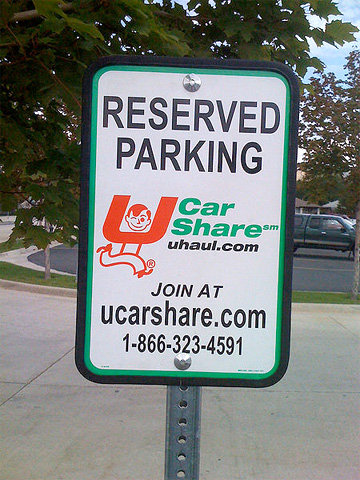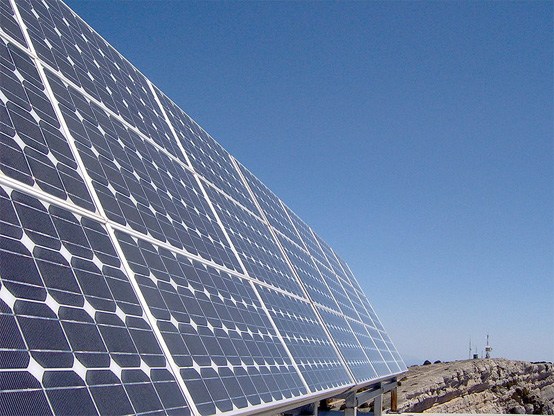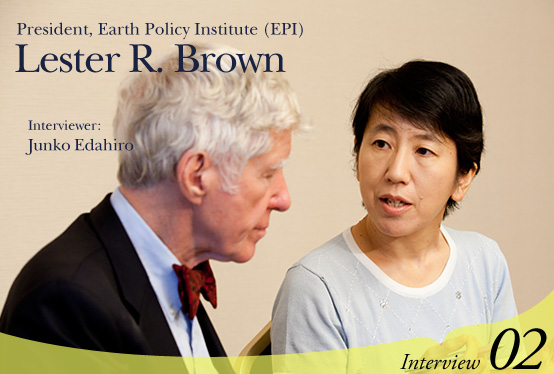- Junko :
- Some Japanese companies are shifting their focus from the production and sales model to what we call "servicizing" models. Not producing and selling cars to consumers. Rather, they are focusing on, for example, car sharing services or rent-a-car services. This will decrease the environmental burden to some extent. And they can increase their profits, not by selling more, but by providing benefits or services to people. Do you see these changes in other places as well?
- Lester :
- Yes. First we went to car rental. You could just rent a car when you needed one. That was one step and we've gone to car sharing, which is the most advanced. We see car sharing now in most cities in the United States and much of Europe.
- This reduces the need for the number of cars on the road. It reduces the need for parking capacity, for example, because the total number of cars for a given population begins to decline. That's because people only have a car when they need one. For many people that is only an occasional weekend trip or something like that. There is no point investing in cars. So we are seeing the shift of expenditures away from goods, to things like education, and health care services. And education and health care are both in the service sector, not in the manufacturing sector.
- Junko :
- Yes, right.
- Lester :
- A more service-oriented economy will arise. With education, who knows how much growth is desirable. But certainly, most of the world could benefit from much more investment in education, much more growth in that sector.
- Junko :
- Very interesting. Shifting to education or to health care and other service sectors will decrease the environmental burden, and at the same time, will increase employment. These service sectors are more labor intensive.

U Car Share's reserved parking sign
Some rights reserved by Russell
- Junko :
- I think that many companies are facing many big challenges. One is declining consumption by consumers. Another is environment-related cost factors, like carbon taxes or rising raw material prices. I think that many companies are searching for solutions. One solution may be shifting to service industries. Another may be to focus on local business. Instead of creating a national industry with multiple manufacturing sites, some are focusing on the small, local business. Is that a viable business model?
- Lester :
- Certainly we are seeing a lot of that in the United States and in the agricultural sector, for example. Any restaurant in the United States that has any standing emphasizes the use of local foods on its menu. The reason for that is local foods are healthier because as food travels long distances, it loses its nutritional value due to deterioration.
- There is also the taste factor. Fresh fruits and vegetables and livestock products taste better than those that have been transported halfway around the world. So we are seeing this shift and we also see it in the farmer's markets. In the U.S., the number of farmer's markets has probably doubled over the last decade and will double again. They are now even getting support from the U.S. Department of Agriculture to help create farmer's markets in towns and cities throughout the country to sort of create a market for local farmers. We are seeing an interesting phenomenon in the U.S. where the number of farms in some situations is increasing, because there are many small farms starting up now. And interestingly, a lot of them are farms managed by women.

- Junko :
- Really?
- Lester :
- Yes, which is counter to the traditional way of thinking about farming.
- Junko :
- Yes, interesting.
- Lester :
- But the reason for this is because they are producing for the local markets, for local restaurants. Even some supermarket chains are now starting to buy locally on a seasonal basis. We are seeing a restructuring of agriculture, which itself reflects the restructuring of the energy economy. Because the old food economy, the old agricultural economy was based on use of huge amounts of oil, including jet fuel to fly fresh vegetables and flowers around the world. That is beginning to change. For one thing, it is becoming too costly. The second thing is we are not going to have a lot of oil to use for jet fuel in the future.
- So we are seeing the localization of the energy economy. That is being paralleled by, and to some extent, driven by, the localization of the energy economy. Localizing energy means localizing agriculture.
- Junko :
- I think that is a very important direction. In Japan, especially after the Great East Japan Earthquake on March 11 and the nuclear power plant accident, many people are rethinking the energy situation in Japan. Until now, energy policy has been driven only by government and industry. Public views and opinions have not been a part of that.
- As a result, government and industry focused on big, centralized energy systems relying on nuclear power. But many people are rethinking the situation. Many are saying that maybe we need more localized energy systems, with solar power and wind power, that can utilize the energy resources in their area.
- In Japan, current systems make it difficult to foster these local, decentralized power systems. But if you look at the overall picture of the world and the world energy situation, do you see a shift from big, centralized power systems to local, decentralized systems?
- Lester :
- We are seeing a number of things happening. We are seeing a shift in electricity from fossil fuels to renewable sources, like wind, solar, and geothermal. And these renewable sources are almost always, by definition, local. You can move oil or coal half way around the world. But it is hard to move wind or solar energy around the world. They are very local.
- Junko :
- Very true.
- Lester :
- So that's one of the things that is happening. Another thing that is happening, and we are still in the early stages of this, is we are seeing an electrification of our transit system. And we see it in the development of plug-in hybrids and also all-electric cars. Both are now moving us from liquid fuel, from oil -- basically, from gasoline -- to what could be wind or geothermal or solar energy.
- In the United States, for example, we can now see the day when we will be running our cars almost entirely on electricity. The equivalent cost will be less than a dollar a gallon. And when you look at the economics, that suddenly becomes very attractive.
- Junko :
- Good point.
- Lester :
- And no one can put an embargo on wind, for example. So it's an exciting possibility. We have great potential. I mean not just the United States, but Japan and the whole world. A team of U.S. and Chinese scientists conducted a national wind inventory, an inventory of wind resources in China. They published their findings in Science magazine. What they concluded was that China can increase its current electricity consumption sixteen-fold from wind alone. I use that as an example just to give a sense of the vastness of the potential.

Photovoltaic power station in Spain
Some rights reserved by Fernando Tomás







